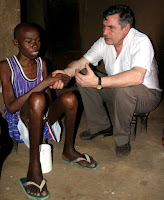Despite all the execrable decisions that he has taken in his life and the disasters he has caused, he is by no means an idiot. At times he makes a lot of sense.
I have always thought it rather odd that people mocked his “Unknown Unknowns” comment, which actually makes perfect sense if you bother to read it.
Here is another comment he made on the issue of global poverty:
Earlier this week I noted that Colonel Gaddafi was saying the right things. Now Donald Rumsfeld is making sense.I was involved in the so-called war on poverty here in the United States and I've traveled the globe and seen just terrible poverty. I had a friend once and he was asked to chair a commission, an international committee, and the title of it was What Causes Poverty. He declined. He said “I will do it but on one condition. The condition is that we change the title and I'll chair a committee on What Causes Prosperity.” The reason he said that was, the title What Causes Poverty leaves the impression that the natural state of the world is for people to be prosperous and that for whatever reason there are prosperous people running around making people poor when you say what causes poverty. He looked at the world the other way. He said the natural state of people is to be relatively poor and that there are certain ways and things that can be done that can cause prosperity. They can create an environment that's hospitable to people gaining education and people gaining investments and people finding ways to contribute in a constructive way.
There are big portions of our globe that are so far behind the rest of the world that it is a dangerous thing. It is an unfortunate thing for those people. It's a heartbreaking thing.
The task for the developed world is to see that we do not just salve our consciences by finding ways like Lady Bountiful, we can give some country this or some country that which then is gone and disappears. But to the contrary, that we find ways to
encourage countries to take the kinds of steps that create an environment that's
hospitable to enterprise and to education so that the nation itself can do those things that will begin to ameliorate the kinds of terrible poverty that we see around the globe.
How long before Hugo Chavez and Polly Toynbee start sounding rational.
Maybe it’s been too long since I had a holiday!




